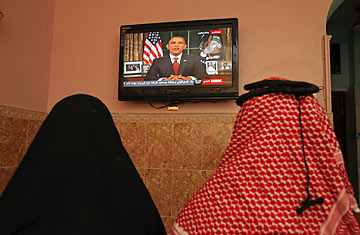
An Iraqi man and his wife in Baghdad watch President Obama's televised speech on Sept. 1, 2010
In the hours after President Obama's "time to turn the page" Iraq speech, many Iraqi politicians were trying to decipher what they could from his words on their country's future in the post-occupation era. Like many government officials, veteran lawmaker Mahmoud Othman stayed awake to hear the American President, who spoke at 3 a.m. Baghdad time. Othman awoke later that morning — the first day of the newly dubbed Operation New Dawn — with both a fresh round of hope and apprehension.
"I think it was a bit out of touch with reality," says Othman, 72, a former member of the U.S.-formed Iraqi Governing Council and now a leader of the Kurdish coalition in the National Assembly. "The withdrawal was done according to a timetable between the U.S. and Iraq, and he was careful not to declare America the victor, as [former President George W.] Bush did. But it clearly comes at an awful time. The government isn't formed, and security isn't stable. It's worrying." Othman adds, "Obama spoke about Iraq as a partner — that was his word. Whether he will keep his word or not, I don't know."
Prior to Obama's 18-minute Oval Office address, U.S. and Iraqi politicians worked overtime to ease concerns that Washington had abandoned Iraq to appease American voters and focus on Afghanistan. Interim Prime Minister Nouri al-Maliki said on national television on Tuesday that "Iraq today is sovereign and independent" and expressed faith in Iraqi security forces, even as insurgent attacks are expected to spike. At the same time, Vice President Joe Biden arrived unannounced to repledge American support and attend Wednesday's ceremony to transition the remaining 50,000 or so U.S. troops into an advisory role. Biden will also attend a whirlwind round of meetings aimed at coaxing rival political blocs into forming a coalition government after slogging through nearly six months of political morass.
Yet even al-Maliki's supporters, who were quick to praise the withdrawal, have taken a wait-and-see approach to Washington's long-term intentions. "In reality, the security agreement we have with the U.S. has much more impact than Obama's speech or Biden's visit," says Abdul Hadi al-Hasani, a senior member of al-Maliki's mainly Shi'ite State of Law Party, which came in an extremely close second in the inconclusive March 7 elections. "Other points he mentioned need to be translated into action in order for Iraqis to believe him. For example, moving fast to train Iraqi security forces and continuing to support Iraq in building a democratic state."
Other political factions were far less willing to give the U.S. the chance to prove its promises. "The Sadr movement doesn't trust the speech of Barack Obama because relations between Iraq and the United States are still not equal, just as they have been for many years," says Qusay al-Suhail, a senior leader in the political movement of hard-line anti-American cleric Muqtada al-Sadr, whose Shi'ite-based party has emerged as a key player in the government-formation process. "Some U.S. military leaders have made it clear that they will conduct joint operations with the Iraqi army in the near future. This means that the combat operations of the U.S. army will continue, and the Sadrists will still consider Obama the president of the occupied state of Iraq. We will trust the U.S. Administration only when the last American soldier has left Iraq."
"The Americans were democracy makers in Iraq," says Hamid al-Mutlaq, a senior leader of the mostly Sunni Iraqiya Party. "They toppled the former regime and brought democracy, so it is their responsibility to protect it. They should do their best to prove to the Iraqi people that their goal behind coming here was to establish democracy, and this can be done if they push to guarantee a peaceful transition of power."
Othman says the success or failure of the U.S. combat withdrawal comes down to three factors: "First, if Iraqi politicians can show responsibility and work with unity, it might provide the political cover that could help shore up the security vacuum left by the U.S. Second, whether the Americans will really treat Iraq like a partner and help Iraqis, especially in training and arming the security forces and giving them enough technology to defend their people. Finally, we have to wait and see how the withdrawal plays into the hands of Iran and al-Qaeda, and how much the regional countries react and interfere." He adds, "All these factors make it very difficult to predict what will happen next for Iraq. But I will say that the years the Americans were here was a very, very difficult time for the Iraqi people."
